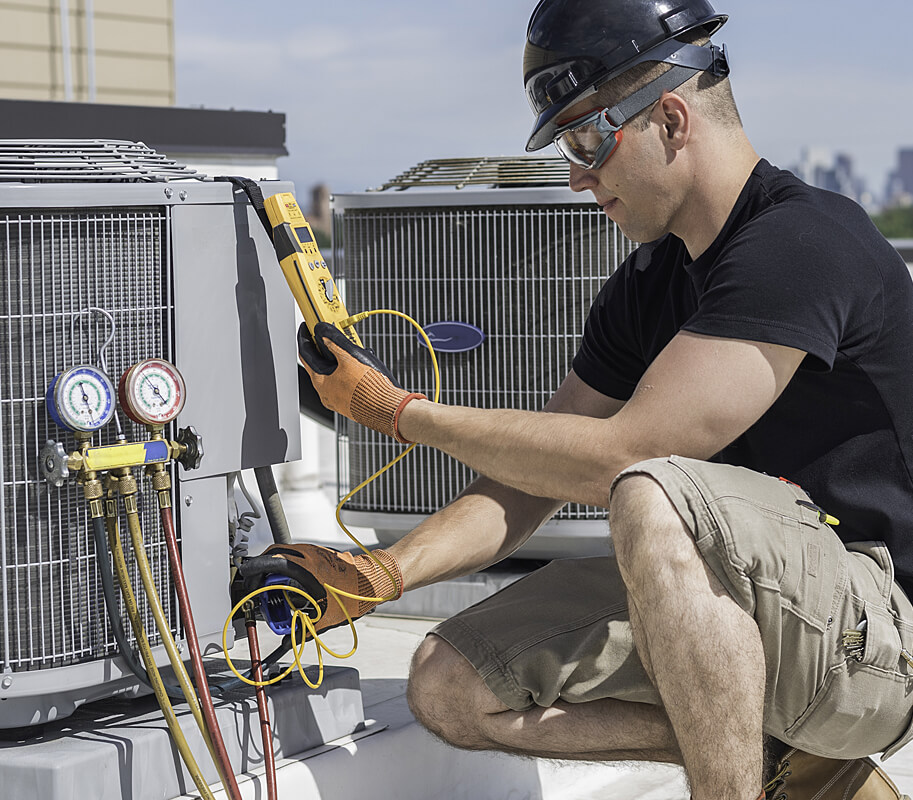
Heating, Ventilation, Air-Conditioning and Refrigeration (HVACR)
If you enjoy troubleshooting and working with your hands, a career as an HVACR technician is calling your name.
COM’s Heating, Ventilation, Air-Conditioning and Refrigeration (HVACR) program prepares students for a successful career as an HVACR technician and/or installer through hands-on training. HVAC technicians work with systems in commercial offices, industrial complexes, manufacturing plants, schools, hospitals, hotels, restaurants, construction and residential homes.
The program is noncredit and nontransferable and will prepare students for employment in a growing occupation. Each course combines classroom instruction with hands-on technical training, a critical part of building skills for this field.
Classes meet two nights per week to accommodate work schedules. Students completing this program receive an Occupational Skills Award, OSHA 10 General Industry Card and EPA credentials.
Program Details
Learning Format
Face to Face
Program Length
37 weeks
Let’s Connect!
 409-933-8415
409-933-8415 ContEd@com.edu
ContEd@com.edu
Career Insights
Occupational summary for Heating, Air Conditioning, and Refrigeration Mechanics and Installers
42,500 Annual Job Openings
(2023-2033)
9% Projected Growth
(2023-2033)
$59,810 yr Median Salary / $28.75 hr
See their Success
Meet these College of the Mainland grads to discover how our programs meet you where you are and take you where you want to go.
Meet Robert Boysel
HVAC
I would absolutely recommend the HVAC program at COM. They're not just somebody who came out of the industry 20 years ago. They are still in it. They understand, and they're really good about walking you through scenarios.
Additional Program Info
Upon successfully completing the HVACR program, students will earn a Certificate of Completion. The final course focuses on EPA certification preparation and examination, where students have the opportunity to receive their EPA Section 608 Certification. Students will gain knowledge from industry professionals and will be able to:
- Understand HVAC Systems – Identify, install, maintain, and repair heating, cooling, and refrigeration systems.
- Apply Safety Standards – Follow industry safety protocols, including proper handling of refrigerants and electrical components.
- Diagnose and Troubleshoot Issues – Use diagnostic tools and techniques to identify and fix HVAC system problems.
- Read and Interpret Technical Documents – Understand blueprints, wiring diagrams, and system schematics.
- Utilize Industry Tools and Equipment – Operate HVAC-specific tools such as gauges, vacuum pumps, and recovery machines.
- Comply with Regulations – Adhere to EPA and industry regulations, including refrigerant handling certification requirements.
- Earn EPA Certification – Successfully complete the EPA Section 608 certification exam, qualifying students to handle and dispose of refrigerants legally.
- Develop Customer Service Skills – Communicate effectively with clients regarding system maintenance and repairs.
The Environmental Protection Agency (EPA) Section 608 Certification is a mandatory certification for HVAC technicians who handle refrigerants in the United States. It ensures compliance with federal regulations regarding the safe handling, recovery, and disposal of ozone-depleting and high-global-warming-potential substances.
Course Name: Basic Electricity for HVAC Course Number: HART-1001
This course is a study of the fundamental principles of electricity as required for the heating, ventilation and air-conditioning trade. Students will demonstrate the proper use of test equipment, electrical circuits and component theory and operation. They will apply electrical calculations and demonstrate electrical safety.
Course Name: Air-Conditioning Level 1 Course Number: HART-1038
This course introduces students to HVAC terminology, tools and skills. The instructor will discuss basic HVAC principles and guide students in hands-on activities. Students will identify and demonstrate use of tools for HVAC, perform brazing and soldering operations and apply trade mathematics.
Course Name: Air-Conditioning Level 2 Course Number: HART-1005
This course is a study of practical applications of air-conditioning principles, including air properties, maintenance operations, thermodynamics and compressors.
Course Name: Air-Conditioning Level 3 Course Number: HART-2036
This is an advanced course in demonstrating troubleshooting principles and the use of test instruments to conduct performance tests and to diagnose problems in air-conditioning and refrigeration components and systems.
Course Name: EPA Course & Test Course Number: HART-1043
Federal regulations require that persons who work with regulated refrigerants be certified. The certification exam verifies that the person has read and understands the requirements of the Federal Clean Air Act.
For information about registration, please contact the Continuing Education Department at ContEd@com.edu or call 409-933-8415.
